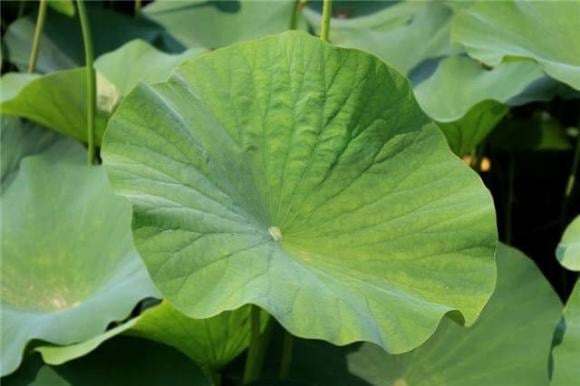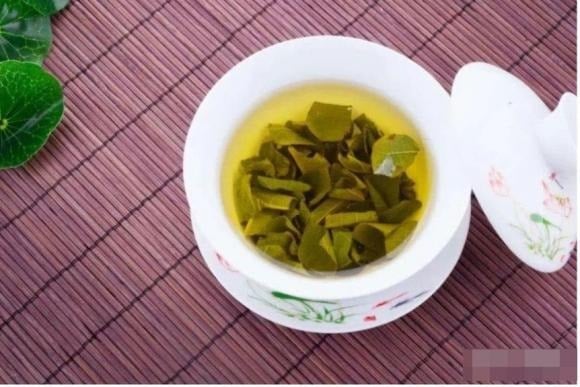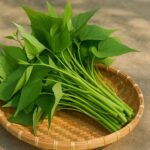Fresh lotus leaves are versatile ingredients used in various nutritious dishes such as steamed chicken with lotus leaves and lotus leaf porridge. Dried lotus leaves are also used to make tea, a refreshing and healthy beverage. But do you truly understand the benefits of lotus leaf tea? And what precautions should be taken to avoid any adverse effects? Let’s explore these in detail below.
Benefits of Drinking Lotus Leaf Tea
Weight Loss and Fat Reduction
Lotus leaves contain precious active compounds such as nuciferine and nelumboine, alkaloids capable of breaking down fat and promoting the excretion of excess fat from the body.
Additionally, the high fiber content in lotus leaves helps increase intestinal peristalsis, aiding in the removal of toxins and harmful substances from the digestive tract. Thanks to these effects, lotus leaf tea is often chosen by overweight individuals as a safe and natural method to support weight loss.

Helps Stabilize Blood Pressure
According to traditional Chinese medicine, the alkaloids in lotus leaves have a vasodilatory effect, gently and effectively lowering blood pressure. This is one of the prominent benefits that makes lotus leaves a popular herbal supplement for individuals with hypertension.
Cardiovascular Benefits
Lotus leaves are rich in flavonoids, potent antioxidants that eliminate free radicals from the body. Flavonoids also enhance the activity of the enzyme SOD, crucial in protecting blood vessels and preventing cardiovascular diseases such as hypertension, atherosclerosis, and coronary artery disease.
Diuretic and Laxative Effects
Due to the presence of alkaloids and high fiber content, lotus leaves stimulate digestion, increase secretion, and promote intestinal peristalsis, thereby aiding in the treatment of constipation and improving digestion. Additionally, lotus leaf tea has a mild diuretic effect, helping the body eliminate toxins and reduce water retention and edema.
Precautions When Drinking Lotus Leaf Tea
Cold Nature of Lotus Leaves
Lotus leaves possess a cold nature, and therefore, lotus leaf tea also has cooling properties. Women during their menstrual period should avoid consuming it as it may cause menstrual cramps, delayed periods, or disturbances in the menstrual cycle.

Avoid Excessive Consumption
Moderation is key. Drinking lotus leaf tea continuously over an extended period may lead to physical debilitation and an imbalance of yin and yang energies in the body.
Not Suitable for Those with Deficient Spleen and Stomach Qi
Individuals with a cold body constitution, frequently experiencing cold hands and feet, or suffering from poor digestion, should refrain from drinking lotus leaf tea as it may exacerbate these symptoms.
Not Recommended for Pregnant and Lactating Women
Pregnant and breastfeeding women should abstain from consuming lotus leaf tea to ensure the safety of both mother and child.
Caution for Those with Deficient Qi and Weak Constitution
Individuals with a weak constitution, low energy levels, and diminished qi and blood should exercise caution before drinking lotus leaf tea, as it may induce fatigue and a lack of vitality.
Avoid Arbitrary Combination with Other Medications
When drinking lotus leaf tea, refrain from mixing it with other herbs or medications without expert guidance to prevent any undesirable reactions in the body.
The Ultimate Guide to Homemade Apple Cider Vinegar: Delicious, Affordable, and Safe
With just a handful of simple ingredients, you can easily craft your very own apple cider vinegar at home. This versatile vinegar boasts a delightful flavor profile and is a fantastic addition to a myriad of dishes. It is also believed to aid in weight loss, offering a potential boost to your health and wellness journey.
Superfood Forgotten: Purslane, Nature’s Beauty and Health Secret.
Water spinach, a humble vegetable that is a familiar sight on Vietnamese dinner tables, boasts an impressive nutritional profile. Packed with vitamins and antioxidants, it is not only beneficial for overall health but also acts as a natural “sunscreen” for the skin. Despite its exceptional qualities, water spinach remains underappreciated in many rural areas.



































